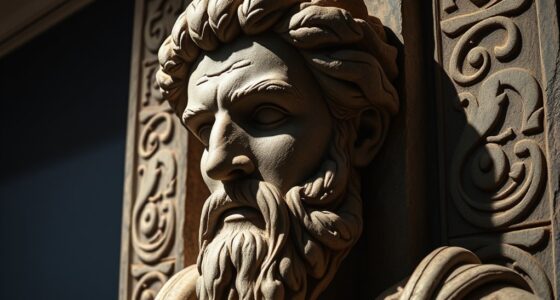Aenesidemus believed that knowing the true nature of reality is impossible because our senses are unreliable. He argued that illusions, dreams, and hallucinations can deceive us, making certainty about the external world elusive. Skepticism challenges you to question whether what you perceive reflects reality or is just a fragile interpretation. If you want to explore how ancient ideas question our ability to truly know the world, there’s more to discover on this intriguing topic.
Key Takeaways
- Aenesidemus argued that senses are inherently unreliable, making knowledge of external reality uncertain.
- He highlighted illusions, dreams, and hallucinations as evidence that perception can deceive us.
- His skepticism suggests that true certainty about the external world is impossible to achieve.
- The tropes emphasize questioning whether perceptions accurately reflect reality or are fundamentally limited.
- Recognizing perception’s flaws leads to ongoing doubt about whether reality can be fully known.

Many thinkers have debated whether reality is truly knowable, raising questions about the limits of human perception and understanding. When you contemplate this, you realize that your ability to grasp what’s real might be fundamentally constrained. This idea ties into perception limits—how your senses and mind process information—and whether those limits prevent you from ever truly knowing the world as it is. Philosophical skepticism deepens this doubt by suggesting that all your beliefs could be mistaken, and there’s no way to confirm your perceptions are accurate. You might see a tree, but how do you know it isn’t an illusion? Or that your senses aren’t deceiving you? Skepticism challenges the notion that you can have certainty about anything outside your immediate experience. It asks: how can you be sure that what you perceive reflects reality accurately?
This line of thought isn’t new. The ancient Greek philosopher Aenesidemus, for instance, raised significant questions about the reliability of perception and the nature of knowledge. He argued that your senses can be fooled—by illusions, dreams, or even hallucinations—and that this makes it impossible to attain certain knowledge about the external world. To him, the problem was that your perception is inherently fallible, and no amount of reasoning can fully eliminate doubt. When you approach the world with this mindset, it’s as if you’re peering through a foggy window—you might see shapes and colors, but you can’t be sure if what’s outside truly matches your view. Aenesidemus’s skeptical approach encourages you to question whether any belief about reality can be justified, given the unreliability of perception itself. Furthermore, modern discussions about epistemology explore how we can justify our beliefs and the extent to which knowledge is possible.
This skepticism urges you to recognize the boundaries of your understanding. It’s not just about doubting specific claims but about accepting that your entire grasp of reality might be limited. The question then becomes whether you should accept these limits or seek ways to overcome them. Some argue that scientific methods, reason, and evidence can help you get closer to the truth, even if absolute certainty remains elusive. Others believe that acknowledging perception limits and embracing skepticism is the most honest approach, preventing you from confidently asserting knowledge that might be false. Ultimately, contemplating these ideas pushes you to reflect on whether reality can ever be fully known or if it’s forever shrouded in mystery. The debate remains open, inviting you to consider how much of what you perceive is trustworthy and how much might be beyond your reach.
Frequently Asked Questions
How Did Aenesidemus Influence Modern Epistemology?
You see, Aenesidemus influenced modern epistemology by highlighting perception limitations, emphasizing that our senses can deceive us. His skepticism encourages you to adopt epistemic humility, acknowledging what you don’t know. This challenges absolute certainty, prompting thinkers today to question assumptions and explore how beliefs are justified. His ideas remind you that understanding reality involves recognizing your cognitive boundaries, shaping a more cautious and reflective approach to acquiring knowledge.
What Are the Main Tropes Used by Aenesidemus?
Imagine you’re traversing a maze, where each turn reveals a new twist. Aenesidemus’ main tropes act like signposts, warning you about perceptual biases and logical fallacies that distort your view. He employs skepticism, questioning assumptions, and highlighting inconsistencies to challenge certainty. These tropes serve as tools, helping you recognize illusions and falsehoods in your quest for truth, guiding you through the labyrinth of knowledge.
Can Aenesidemus’s Skepticism Be Applied to Scientific Knowledge?
You wonder if Aenesidemus’s skepticism can apply to scientific knowledge. His focus on empirical limitations suggests that scientific certainty may be fragile, as observations can be flawed or incomplete. You realize that while science aims for certainty, it’s always limited by the data available. So, applying his skepticism reminds you to remain cautious, understanding that scientific claims are provisional and subject to change with new evidence.
How Does Aenesidemus’s Work Relate to Contemporary Philosophy?
You see, Aenesidemus’s work highlights perception limitations and skepticism application, which still resonate in contemporary philosophy. By questioning how we understand what we perceive, his ideas challenge assumptions about certainty and knowledge. Today, philosophers use his skepticism to explore the boundaries of human understanding, emphasizing that our perceptions may be unreliable. His ideas remind us to critically evaluate our beliefs and recognize the limits of what we can truly know.
Are There Practical Implications of His Skepticism Today?
Imagine questioning everything like a modern Socrates—practical skepticism becomes your tool for steering through daily doubts. Aenesidemus’s work reminds you that uncertainty isn’t just philosophical; it influences your decisions, trust, and perceptions. Embracing everyday doubt helps you avoid dogmatism and stay open-minded. His skepticism encourages critical thinking, urging you to question assumptions and seek clarity amid life’s ambiguities, making your interactions more thoughtful and your worldview more flexible.
Conclusion
So, as you stand at the edge of understanding, the horizon of reality seems both distant and shimmering. The fog of doubt lingers, yet the flicker of curiosity keeps you moving forward. Like a faint star in a vast night sky, certainty feels just out of reach, but the journey itself ignites a spark within. Embrace the mystery, for in seeking answers, you ignite the light that guides your soul through the unknown.









